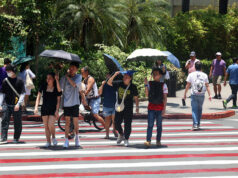DILG, BFAR plan to add teeth to inshore bottom-trawling ban
THE Department of Interior and Local Government (DILG) and the Bureau of Fisheries and Aquatic Resources (BFAR) signed a joint memorandum circular on Wednesday strengthening enforcement of the ban on bottom trawling within municipal waters.
JMC 2018-03 states that bottom trawling disturbs the seabed and destroys the complex structure of benthic habitats by direct removal of biological and topographic features.
Bottom trawling is a fishing method using a bag-shaped net which is dragged or towed along the bottom.
The catch often includes juvenile fish and spawners as well as non-commercially valuable, endangered, threatened and protected marine species and organisms.
The liable parties include the boat’s owner, operator, captain and master fishermen, chief executive officer of the fishing company or the managing partner of a partnership, who will be liable for confiscation of the catch, fishing gear, and a fine of three times the value of the catch, or the following fines, whichever is higher:
• P20,000 for municipal fishing, or community service if unable to pay;
• P50,000 for small-scale commercial fishing
• P100,000 for medium-scale commercial fishing;
• P500,000 for large-scale commercial fishing.
Upon conviction by a court of law, the violators also face imprisonment of two to six years and a fine equivalent to twice the administrative fine, confiscation and forfeiture of fishing gear and catch, according to the circular.
Gloria E. Ramos, lawyer and vice-president of environmental group Oceana Philippines, told reporters in Mandaluyong on Thursday: “The Fisheries Code of 1998 declared bottom trawling illegal, but what actually happened was that small vessels with gross tonnage of less than three tons continued to do it but were unregulated. The boats were also unregistered. The LGUs [local government units] did not register the boats.”
“We have a study. We came up with a policy and then we used that to present to the government. Last December, they all agreed. All agencies agreed to come up with the joint implementing guidelines to ban bottom trawling. There is a technical working group chaired by BFAR and DILG to oversee the implementation,” Ms. Ramos said.
Ms. Ramos said that many livelihood will be affected by the strict implementation of the ban, and there needs to be collaboration with the government to provide livelihood assistance.
In the JMC, livelihood assistance will be facilitated by the Department of Social Welfare and Development (DSWD), Department of Trade and Industry (DTI), Department of Labor and Employment (DoLE), Department of Tourism (DoT) and the Technical Education and Skills Development Authority (TESDA).
“In the public consultation, the issue of livelihood came up in case boats need to be decommissioned. Many agencies committed to help,” Ms. Ramos said.
“LGUs have the primary responsibility. They should decommission boats, issue ordinances, provide a transition period. After a certain period, the guidelines say that the crews of any boats caught in violation and forced to decommission can no longer access the livelihood program,” Ms. Ramos said. — Reicelene Joy N. Ignacio



